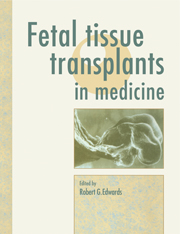Book contents
- Frontmatter
- Contents
- List of contributors
- Preface
- 1 Differentiation and transplantation of embryonic cells in mammals
- 2 Organogenesis and central nervous system development
- 3 Experimental human hematopoiesis in immunodeficient SCID mice engrafted with fetal blood-forming organs
- 4 Ontogeny of human T- and B-cell immunity
- 5 The procurement of human fetal tissues for clinical transplantation. Practice and problems
- 6 Transplantation of fetal haemopoietic and lymphopoietic cells in humans, with special reference to in utero transplantation
- 7 The biology of fetal brain tissue grafts: from mouse to man
- 8 Clinical results of transplanting fetal pancreas
- 9 The suitability of fetal and infantile donors for corneal transplantation
- 10 Transplantation of ovaries and testes
- 11 Cell grafting and gene therapy in metabolic diseases
- 12 The low temperature preservation of fetal cells
- 13 Law and ethics of transplanting fetal tissue
- Appendix: Code of practice on the use of fetuses and fetal material in research and treatment
- Brief bibliography on various aspects of transplanting fetal 337 tissue
- Index
Appendix: Code of practice on the use of fetuses and fetal material in research and treatment
- Frontmatter
- Contents
- List of contributors
- Preface
- 1 Differentiation and transplantation of embryonic cells in mammals
- 2 Organogenesis and central nervous system development
- 3 Experimental human hematopoiesis in immunodeficient SCID mice engrafted with fetal blood-forming organs
- 4 Ontogeny of human T- and B-cell immunity
- 5 The procurement of human fetal tissues for clinical transplantation. Practice and problems
- 6 Transplantation of fetal haemopoietic and lymphopoietic cells in humans, with special reference to in utero transplantation
- 7 The biology of fetal brain tissue grafts: from mouse to man
- 8 Clinical results of transplanting fetal pancreas
- 9 The suitability of fetal and infantile donors for corneal transplantation
- 10 Transplantation of ovaries and testes
- 11 Cell grafting and gene therapy in metabolic diseases
- 12 The low temperature preservation of fetal cells
- 13 Law and ethics of transplanting fetal tissue
- Appendix: Code of practice on the use of fetuses and fetal material in research and treatment
- Brief bibliography on various aspects of transplanting fetal 337 tissue
- Index
Summary
In this Code fetus means the embryo or fetus from implantation until gestation ends and, unless qualified by the words in utero, includes the fetus outside the womb.
Treatment of the fetus
1.1. Two categories of fetus are recognised:
(a) The live fetus, whether in utero or ex utero, which should be treated on principles broadly similar to those which apply to treatment and research conducted with children and adults.
(b) The dead fetus. The determination of death shall be by reference to the absence of vital functions, as indicated by the absence of spontaneous respiration and heartbeat after consideration of possibly reversible factors, such as the effects of hypothermia in the fetus, or of drugs or metabolic disorders in the mother. This determination shall be made or confirmed by a doctor responsible for the clinical management of the mother and the fetus and not involved with the subsequent unconnected use of fetal tissue.
Only tissue from the dead fetus is ethically available for use in therapy.
1.2. It is unethical to administer drugs or carry out any procedures during pregnancy with the intent of ascertaining whether or not they might harm the fetus.
1.3. In the case of nervous tissue only isolated neurones or fragments of tissue may be used for transplantation.
Contents of the uterus other than the fetus
The contents of the uterus resulting from pregnancy other than the fetus (ie the placenta, fluid and membranes) may be used for research or therapeutic purposes subject to the conditions relating to screening at section 4.5 of this Code and those relating to finance at section 7.
Separation of the supply of fetal tissue from the practice of research and therapy
3.1. The decision tq carry out an abortion must be reached without consideration of the benefits of subsequent use. The generation or termination of pregnancy to produce suitable material is unethical.
3.2. The management of the pregnancy of any mother should not be influenced by use of the fetus in research or therapy.
- Type
- Chapter
- Information
- Fetal Tissue Transplants in Medicine , pp. 331 - 336Publisher: Cambridge University PressPrint publication year: 1992

